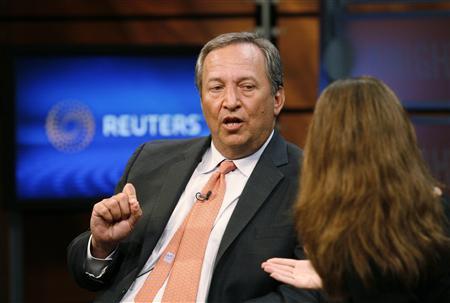www.aljazeerah.info
News, September 2013
Archives
Mission & Name
Conflict Terminology
Editorials
Gaza Holocaust
Gulf War
Isdood
Islam
News
News Photos
Opinion Editorials
US Foreign Policy (Dr. El-Najjar's Articles)
www.aljazeerah.info
|
Editorial Note: The following news reports are summaries from original sources. They may also include corrections of Arabic names and political terminology. Comments are in parentheses. |
Lawrence Summers Loses Federal Reserve Chief Nomination After Opposition from Democrats for his Contribution to 2008 Financial Disaster
Summers, who many accuse of sowing the seeds of the recent financial crisis by refusing to regulate derivatives and easing restrictions on banks when he was Treasury chief from 1999 to 2001.
 |
|
| Senior White House economic adviser Lawrence Summers speaks during an interview with Reuters in Washington in this June 24, 2010 file photo, Reuters/Molly Riley |
Defecting Democrats doomed Summers bid for Fed job
By Rachelle Younglai and Alister Bull
Mon Sep 16, 2013 8:25pm EDT
WASHINGTON (Reuters) -
The death knell for Lawrence Summers' candidacy to lead the Federal Reserve came on Friday morning with a shock phone call message left for President Barack Obama's chief of staff, Denis McDonough.
The message was from Democratic Senator Jeff Merkley, a member of the Senate Banking Committee from Oregon and a vocal critic of the prospects of a Summers nomination for the central bank's chairmanship.
Merkley told the White House that there were now five Democrats on the committee, which would have to clear the nomination before a final Senate vote, who would oppose Summers, a former Treasury secretary under President Bill Clinton and a close confidante of Obama's.
Up until Friday, only two - Merkley and Senator Sherrod Brown from Ohio - had publicly signaled how they would vote.
But fierce Wall Street critic Senator Elizabeth Warren of Massachusetts had privately told the White House she was uncomfortable with the prospective nomination and, according to a Senate aide, Heidi Heitkamp of North Dakota also had concerns.
The surprise on Friday was not only the number of senators deciding to vote no but that one of them was centrist Democrat Jon Tester of Montana, whose opposition showed that concerns about the former Treasury secretary were not confined to the liberal wing of the party.
"Four seemed insurmountable. Five was just game over," said a Senate aide.
After Merkley called the White House, an Obama administration official called Tester, Tester's spokeswoman said. But the early afternoon phone call was too late to change his mind.
The five "no votes" on the committee posed a potentially unassailable obstacle for Summers. Democrats only have a two-vote majority on the panel and at least three Republicans were also expected to vote against Summers.
Summers dropped out of consideration for the top Fed job on Sunday, writing to Obama that any confirmation process would likely be acrimonious. People familiar with the situation said on Monday that Federal Reserve Vice Chair Janet Yellen had become the frontrunner now that Summers has withdrawn.
NO HELP FROM WHITE HOUSE
Some critics of the administration's strategy for the Summers nomination say that the White House has itself to blame for allowing opposition to fester.
The White House did little to ease Senators' concerns about Summers, who many accuse of sowing the seeds of the recent financial crisis by refusing to regulate derivatives and easing restrictions on banks when he was Treasury chief from 1999 to 2001.
After 20 of 54 members of the Democratic caucus in the Senate sent Obama a letter in July urging him to nominate Yellen to lead the central bank, there was little to no communication between the White House and members of the Banking Committee, Senate aides said.
One congressional aide said: "You would assume the (Capitol) Hill charm campaign would take place." But it never did.
"At the beginning, the White House was not taking (the opposition) all that seriously," said a Democratic Senate aide. "We tried to make sure that they knew it was real. We were always urging them to take it seriously," the aide said.
In a series of calls between aides to Democratic Senate Majority Leader Harry Reid and the White House over the August break, Reid's office stressed the "magnitude of difficulty" that would come with getting Summers confirmed, a Senate aide said.
The message to the White House was: "What we need going into the fall is Democratic unity. We made it clear (a Summers nomination) would be harmful to the cause of Democratic unity."
(Additional reporting by Jeff Mason; Editing by Tim Dobbyn)
Fair Use Notice
This site contains copyrighted material the
use of which has not always been specifically authorized by the copyright
owner. We are making such material available in our efforts to advance
understanding of environmental, political, human rights, economic,
democracy, scientific, and social justice issues, etc. We believe this
constitutes a 'fair use' of any such copyrighted material as provided for
in section 107 of the US Copyright Law. In accordance with Title 17 U.S.C.
Section 107, the material on this site is
distributed without profit to those
who have expressed a prior interest in receiving the included information
for research and educational purposes. For more information go to: http://www.law.cornell.edu/uscode/17/107.shtml.
If you wish to use copyrighted material from this site for purposes of
your own that go beyond 'fair use', you must obtain permission from the
copyright owner.
|
|
|
|
||
|
||||||


